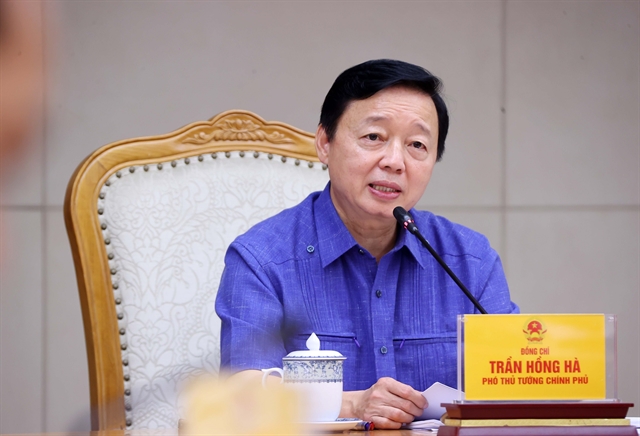 Environment
Environment


|
| Deputy Prime Minister Trần Hồng Hà chairs a meeting with various ministries and departments to review the draft Programme for the Development of the Environmental Industry to 2030 on Wednesday in Hà Nội.—VNA/VNS Photo Văn Điệp |
HÀ NỘI — Deputy Prime Minister Trần Hồng Hà has ordered that the environmental industry must be firmly established as a key economic sector, playing a strategic role in ensuring national independence and self-reliance along with addressing Việt Nam’s environmental challenges.
The long-term goal should be exporting environmental technologies, products and services, he noted.
Hà gave the order on Wednesday morning at the Government headquarters, while he chaired a meeting with various ministries and departments to review the draft Programme for the Development of the Environmental Industry through 2030.
The deputy PM stressed the need for clearly defined targets across each field within the environmental industry.
He said that, as an example, waste management must set concrete targets for the complete treatment of municipal solid waste and hazardous waste as well as both urban and industrial wastewater.
As for the circular economy, specific recycling and reuse rates should be outlined for sectors like manufacturing, construction and mining.
Clean energy targets must reflect the rate of adoption in production, transport and construction, while environmental monitoring must specify the number of monitoring stations, levels of automation and geographic coverage.
An ecosystem of environmental services should also be developed with the participation of a diverse range of economic stakeholders.
“All targets must be linked to domestic technological capacity, from partial importation to full localisation, in order to reduce reliance on foreign equipment,” Deputy PM Hà said.
Offering comments on the draft programme, the deputy PM pointed out that the current draft remains largely directional, lacking specific and measurable objectives.
It also fails to clearly assign responsibilities to leading or implementing agencies, and does not include a concrete implementation roadmap or performance metrics.
The Ministry of Industry and Trade was tasked with reviewing its approach, defining detailed goals and setting out a clear development timeline for each phase of the environmental industry’s growth.
Hà also told the ministry to assess existing institutional frameworks and policies and to propose necessary amendments, particularly in the areas of taxation and finance.
He suggested reviewing import and corporate tax policies to better align with development objectives, as well as establishing incentives for enterprises that invest in technology transfer or meet environmental standards.
Support should also be provided for research and development, technology transfer and workforce training, he said.
The programme must include clearly defined roles and responsibilities across research, production, investment and the issuance of standards and regulations.
It should also identify a list of priority technologies and products for the 2025-2030 period. These include waste-to-energy technology, urban and industrial wastewater treatment, recycled construction materials, recycling of renewable energy waste environmental monitoring systems, bioplastics and green materials.
Stressing the importance of private sector participation, the deputy PM stated that for high-cost, high-risk areas or where domestic private enterprises lack sufficient capacity, the public sector must take the lead.
Such areas include hazardous waste treatment, development of environmentally friendly materials, large-scale environmental monitoring and the recycling of wind and solar energy waste.
State-owned enterprises in energy, construction and industry should be assigned pilot environmental projects that can be scaled up nationwide.
At the same time, public–private partnerships in research and development of new products should be actively promoted.
“The Government will provide funding, infrastructure and workforce training, while businesses will be responsible for implementation, operation and commercialisation,” he added.
According to the draft programme, by 2030, technologies, equipment and products from the domestic environmental industry must meet between 60 per cent and 80 per cent of the country’s needs in wastewater, gas emissions, solid and hazardous waste treatment and environmental monitoring.
This proportion is expected to rise to 80-90 per cent by 2035.
The programme further highlights the importance of scientific research, technology transfer, and the development of new products, particularly in advanced waste treatment, recycling, energy efficiency, and smart production.
In parallel, developing a high-quality workforce is considered a key solution for advancing the environmental industry.— VNS




